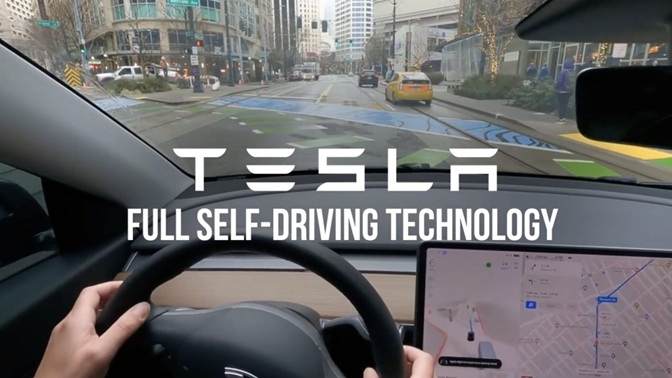Tesla has been waiting for China’s approval to launch its Full Self-Driving (FSD) system, but new reports suggest that this is about more than just regulatory hurdles. The latest buzz? China might be using Tesla’s FSD approval as leverage in the ongoing trade war with the United States.

This situation puts Tesla in a tricky position. China is Tesla’s most important market, the only one where its sales are holding steady despite growing competition. But now, as China delays FSD approval, it raises questions:
- Is this about safety, or is it political?
- How much does this affect Tesla’s future?
- Could Elon Musk be pressured to lobby for China in U.S. trade negotiations?
Tesla’s FSD Struggles in China
Tesla has been pushing to get Full Self-Driving (FSD) approved in China for a while now. There were reports in 2023 that a deal was close, but here we are in 2025, and it still hasn’t happened.
Why? Because of data restrictions.
- China won’t allow Tesla to send driving data and training videos out of the country
- The U.S. won’t allow Tesla to train its system in China
This creates a deadlock—Tesla’s FSD technology needs massive amounts of real-world data to improve, but China’s strict data laws won’t let Tesla use local driving footage outside of the country.
Elon Musk recently addressed the issue during Tesla’s latest earnings call, saying:
“They won’t currently allow us to transfer training video outside of China. And then the US government won’t let us do training in China. It’s a bit of a quandary.”
Because of this, Tesla has been relying on publicly available footage and driving simulations to train its AI for China’s roads—a far from ideal solution. Despite the setbacks, Musk remains optimistic, claiming Tesla is still targeting an early 2025 launch for FSD in China and Europe. But, let’s be honest—he’s been making similar promises in the U.S. for the last six years.
- China is Tesla’s strongest market, with sales remaining steady while other regions see declines.
- BYD, Tesla’s biggest competitor, just launched its own self-driving tech, intensifying the competition.
- If Tesla’s FSD is blocked in China while local rivals gain approval, it puts Tesla at a huge disadvantage.
In short, FSD approval is critical for Tesla’s success in China. If it doesn’t happen soon, BYD and other Chinese automakers could dominate the space, leaving Tesla behind. And the Chinese government seems to know this very well.
FSD Approval Becomes a Trade War Bargaining Chip
A new Financial Times report reveals that China might be delaying Tesla’s FSD approval on purpose—not for regulatory reasons, but as a negotiation tactic in the ongoing trade war with the U.S.. Insiders claim that the approval delay is directly linked to trade negotiations with former President Donald Trump, who is expected to be a key player in future U.S.-China relations.
Essentially, China is sending a message:
“If the U.S. eases its trade restrictions and tariffs, maybe Tesla will get its FSD approval in China.”
From China’s perspective, this is a strategic move.
- Tesla is one of the most valuable American companies
- Elon Musk’s wealth is tied to Tesla’s stock, which is tied to self-driving technology
- If Tesla can’t launch FSD in China while its competitors can, it loses its edge
This puts Musk in a tough spot. If Tesla’s future in China depends on U.S. trade policy, could Musk be forced to push U.S. lawmakers to ease tariffs on China?
This situation highlights three big-picture takeaways:
1️⃣ China Is Playing Smart with U.S. Trade Tactics
At first glance, using the approval of a single car feature as a bargaining chip might seem small in the grand scheme of the trade war. But in reality, this is a brilliant strategy.
- Tesla’s FSD tech is crucial to its long-term success
- Musk has direct influence over U.S. policymakers, making him a key figure
- A weakened Tesla in China could boost local EV makers like BYD, strengthening China’s economy
By delaying FSD approval, China is increasing its leverage in trade negotiations without making any major economic sacrifices.
2️⃣ Tesla’s Dependence on China Is a Risk
For Tesla, China is a double-edged sword.
✅ It’s a massive market for EVs
✅ It’s the only major region where Tesla’s sales aren’t falling
❌ But regulatory roadblocks can disrupt business at any moment
❌ Tesla is competing with rapidly improving Chinese EV brands
If Tesla becomes too dependent on China for growth and profitability, it leaves itself vulnerable to future government decisions outside its control.
3️⃣ Could Musk Be Pressured to Lobby for China?
It’s no secret that Elon Musk has Trump’s ear. If China keeps delaying FSD approval, Musk could feel pressured to personally advocate for a trade deal that benefits China—just so Tesla can move forward.
Would Musk step in and lobby for China? It’s possible. After all, his entire fortune is tied to Tesla, and Tesla’s future growth depends on expanding FSD into China.
At first glance, Tesla’s struggle to get FSD approved in China looks like a technical issue—but it’s actually deeply political.
With China using Tesla’s approval as a bargaining chip in trade talks, Musk is in a tough spot.
- If Tesla doesn’t get approval, it risks falling behind in China
- If Musk pushes U.S. lawmakers to ease trade restrictions, it could spark controversy
As the trade war between the U.S. and China escalates, Tesla is now caught in the middle. Will Musk stand back and wait? Or will he step in and play politics to protect Tesla’s future? Only time will tell. But one thing is certain—the road ahead for Tesla in China just got a lot more complicated.
Related Post
